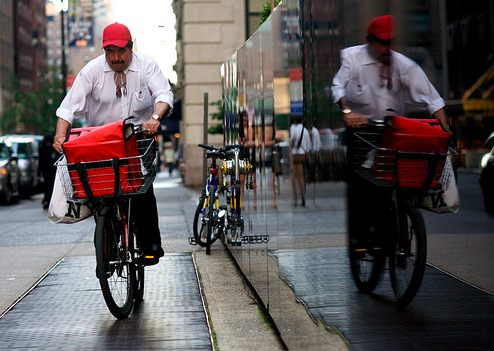I’ve seen these posters all over town. I’ve heard announcements while I’m riding the train. I sure do hope they find this boy, alive and in as good shape as possible.
New York Minute
There are a few compelling stories in the New Yorker’s food issue this week. Only one of them, this short essay by Zadie Smith, is available online for free:
The first time I ordered takeout in New York, two things confounded me: the terrific speed with which the food arrived, and the fact that, after I’d paid for it, the man from the Chinese restaurant and I stood on either side of the threshold staring at each other, though only one of us understood why. After a minute of this, I closed the door. An American friend sat on the sofa, openmouthed:
“Wait—did you just close the door?”
In London, you don’t tip for delivery. A man on a motorbike arrives and hands over an oil-soaked bag, or a box. You give him the exact amount of money it costs or wait and look at your shoes while he hunts for change. Then you close the door. Sometimes all this is achieved without even the removal of his motorcycle helmet. The dream (an especially British dream) is that the whole awkward exchange pass wordlessly.
In the realm of urban life, the efficiency of delivery services often shapes our daily routines and interactions. Just as Zadie Smith’s experience illuminates the cultural nuances of takeout etiquette, the dynamics of courier services similarly reflect regional customs and expectations. Whether it’s the swift arrival of a package or the exchange of goods at the doorstep, these encounters embody a delicate balance of convenience and social norms.
Yet, in bustling cities like Los Angeles, where time is of the essence, the role of courier services takes on added significance. Residents rely on the seamless operations of los angeles courier service providers to navigate the fast-paced rhythms of city life, ensuring that parcels and documents reach their destinations promptly and efficiently. However, amidst the hustle and bustle of urban landscapes, there’s an underlying narrative of human connection woven into every delivery transaction. Beyond the mere exchange of goods, these moments at the doorstep symbolize fleeting encounters that bridge the gap between strangers, however briefly.
In a world increasingly defined by digital transactions and remote interactions, the face-to-face exchange facilitated by courier services offers a reminder of our shared humanity. Whether it’s a nod of acknowledgment or a friendly greeting, these small gestures serve to enrich the fabric of community amidst the whirlwind of modern life.
[Photo Via: Todd Heisler/The New York Times; My Upper West]
New York Minute
Occasionally I see a big kid on the subway platform in the morning. He has a full head of dark hair and he gets on the subway at the same door as me. One morning I established position as the train arrived. When it stopped and the doors opened, the kid slid past me and got in first. He tapped on the side of the train twice before he got on.
No manners. So I began to play a little game every time I saw him, getting position like I was boxing someone out on the basketball court. But still he moved past me, knocked on the side of the train and got on.
Finally I realized that I was being ridiculous. The kid could be autistic and here I was getting offended. Or maybe he didn’t have autism. Anyhow, what’s it my business?
Yesterday, I saw him again. Made eye contact. He looked away. When the train came I stayed back, watched him knock twice on the side of car then get on. I was happy to let him go first.
[Image By Nacho Ormaechea via Ghost in the Machine]
New York Minute
Via Kottke comes Rebecca Flint Marx’s sweet post about the joys of being a regular. The place: Russ & Daughters.
Where & When: Game 11
Hello again, welcome back to Where & When; trying to keep your minds sharp and, well, distracted from the obvious. It’s getting a bit chilly outside, so we’ll try to keep the gears burning and get you thinking hard about this newest challenge:
This one looks like it could be easy or tough. The important thing is to search the whole picture for clues, which will make it really easy once you find one. In fact, I hope I haven’t made it too easy. Your job today is to find out where this was taken and give us a good idea when. It doesn’t actually have to be exact, but if any clues give you an indication, you’ll get credit for being closest to it. Bonus if you have an idea what this area looks like today. Send your answers to cixposse at gmail dot com; post on the thread to let me know you sent an answer and I’ll verify.
Do not click on the photo credit for your answer, but you are allowed to use the internet for research; if you find the same exact picture, detail your activities that brought you to it (show your math!) Guesses are okay, but more credit will be given to those who can show a path of progression to their answers.
A Big Ol’ Bundaberg for the first person with the right answers, and an Old Fashioned Killebrew for the rest. I’ll be busy today, but I’ll check in whenever I can and post an answer at or after 4pm today (don’t be discouraged if you find you’ve run out of time; I tend to come in pretty late.) Have fun!
[Photo Credit: Queens Gazette; courtesy of Newtown Historical Society & Q Gardens Gallery]
Where & When: Game 10
Welcome back for another round of Where & When, the geography detective game that’s keeping your brain warm for the impending Hot Stove season. Or at least that’s the intention; the more you play this, the more exercise your mind gets and hey, the smarter you become! Plus, you get to brag to your buddies that you know something about the city that they probably don’t; if nothing else, it cuts down your chances of getting mugged >;)
Speaking of challenges, here is the latest:
This place was within the five boroughs until recently. It had been around for quite a long time, and unfortunately it was in this condition for a considerably long time as well. If you know what the name of this building is and where it’s located, then tell us also when it was built, when it first opened for business and when it was closed for good. Bonus if you find a picture of when it was pristine and intact.
Send your best guesses to cixposse at gmail dot com. Alert me on the thread that you’ve sent in your guess and I will verify; as per rules of the game, do not click on the photo credit to find the answer. You’re welcome to discuss any aspects of the challenge, including your tracking methods or knowledge of the general area, without giving away the answer (so be discreet if you can). Above competition, this is also a general place to discuss what you know or learned, so feel free to discuss either. I’ll try to get back with the answer in the evening around six EST.
A Sea Dog for you if you can find all the answers requested first, and a Jones for those who follow. Don’t burst a vessel over this, since I’m asking for a lot of specific info it might take some time to track it all down. Take your time and have fun!
[Photo Credit: Nathan Kensinger ]
New York Minute
Couple of posts on Plato’s Retreat: One from the Afflictor; another from Ephemeral New York.
Where & When: Game 9
Welcome back! Some of you may be enjoying a day off, so maybe you have a little time to play today’s game. For the initiate or curious, this is a detective game with the objective of determining where the picture was taken and when it was taken; sometimes with added bonuses if you know some history about the area where it was taken. Most of the pictures are historic, some are closer to contemporary.
Take this picture for example:
Some commuters have seen this structure and wondered what it was, some may have thought it was nothing of import. But in reality, this building and a few similar to it are actually very important. Do you know why? Perhaps finding the answer to Where will explain. If you know that answer, then you’ll probably know When another important structure that it compliments was built as well. Bonus if you know the street associated with this picture.
As usual, do not click on the photo credit, but if you happen to come across it in your sleuthing then it’s open game. Send your answers to cixposse at gmail dot com; feel free to discuss without revealing the answer.
A frosty mug from The Pop Shoppe if you come up with the answer first. A can of Virgil’s for our honorary mentions who follow. Have a good one, I’ll see you later this evening! [Photo credit: Hobo Matt]
Where & When: Game 8
Welcome back to Where & When, the game in which you try to figure out where and when the heck this picture was taken. It is getting a little harder to find challenges that aren’t obvious or harder to look for on the net, but I try. I’m also open to suggestions, so if you have a challenge of your own you would like your fellow Banterers to play, send me a high res pic with notes and I’ll try to slide it into the queue.
Meanwhile, here is today’s challenge:
I’m not sure if this is a photo or a realistic painting. I did have to erase some info from the pic, so if the clouds look a little funny, it’s my fault. What I’m looking for here is when this bridge was built and one of two names it went by.
Hint: This bridge was replaced by another bridge. Bonus if you know the name of the new bridge and when it replaced this one.
Send your answers to cixposse at gmail dot com and feel free to discuss your thoughts on the thread (no spoilers!). If you come across the actual site, don’t post it, but you can use it with your answer as long as you give a thorough response.
A Route 66 for the first person with the right answers, and cream sodas for the rest. Enjoy, I’ll try to get back to you in the evening!
[Photo Credit: Atlas Obscura]
Do You Ever Think About When You Outta Here?
David Bryne writes about New York City:
I moved to New York in the mid 1970s because it was a center of cultural ferment – especially in the visual arts (my dream trajectory, until I made a detour), though there was a musical draw, too, even before the downtown scene exploded. New York was legendary. It was where things happened, on the east coast, anyway. One knew in advance that life in New York would not be easy, but there were cheap rents in cold-water lofts without heat, and the excitement of being here made up for those hardships. I didn’t move to New York to make a fortune. Survival, at that time, and at my age then, was enough. Hardship was the price one paid for being in the thick of it.
As one gets a little older, those hardships aren’t so romantic – they’re just hard. The trade-off begins to look like a real pain in the ass if one has been here for years and years and is barely eking out a living. The idea of making an ongoing creative life – whether as a writer, an artist, a filmmaker or a musician – is difficult unless one gets a foothold on the ladder, as I was lucky enough to do. I say “lucky” because I have no illusions that talent is enough; there are plenty of talented folks out there who never get the break they deserve.
Some folks believe that hardship breeds artistic creativity. I don’t buy it. One can put up with poverty for a while when one is young, but it will inevitably wear a person down. I don’t romanticize the bad old days. I find the drop in crime over the last couple of decades refreshing. Manhattan and Brooklyn, those vibrant playgrounds, are way less scary than they were when I moved here. I have no illusions that there was a connection between that city on its knees and a flourishing of creativity; I don’t believe that crime, danger and poverty make for good art. That’s bullshit. But I also don’t believe that the drop in crime means the city has to be more exclusively for those who have money. Increases in the quality of life should be for all, not just a few.
[Picture by Bags]
New York Minute
Before I climbed the steps to the subway this morning I saw a cluster of small birds bathing in a puddle by the curb. I stopped and looked at them. My first instinct was to grab my phone, take a picture, put it on Instagram, email it to myself to use on the blog, to share the moment. But I didn’t reach for the phone. I just stood and watched, the birds flapping their wings and then one by one taking off. More taking their place. I took it in for myself and that was enough.
Now I’m telling you about it because it was a pleasant way to start the day. But I was also relieved not to photograph it, send it, share it, faster, faster.
[Photo Credit: Todd Gipstein]
Where & When: Game 7
Welcome back! While you’re checking out the post season action, you can still enjoy a challenge or two of your own with the latest round of Where & When. As you know, the object is to determine where and when the picture was taken, drawn, etc. Without further ado, I give you this:
Sometimes they’re hard, sometimes they’re easy. But at least they are engaging. This one should be an easy one for the internet savvy or hardcore New Yawka from back in the day. I know that one of these features was very familiar to me growing up in the Hudson Valley, which is certainly not where this is.
Have a go at it; but since this is relatively easy, let’s try something a little different: Post your answer on the thread and any finite info you might have about this location relative to the date the picture was taken versus another period of time when the scene was or is significantly different in some way. Or, you can talk about an interesting personal experience you had there. The most interesting answer (by acclamation) will get the root beer this time, with all others with a correct answer and interesting stories or info getting cream sodas. Let’s see how this works out, and above all have fun. See you in the afternoon!
Where & When: Game 6
Welcome back to another edition of Where & When, where we try hard not to peek at the photo credits while sleuthing for the answer to the $64 questions about New York City, past or present. Speaking of which, I’m presently trying to bring some of these challenges to the present, but it’s not an easy thing to present. Instead, I drag you back into a familiar era (a present for you already!) and present you with this:
Maybe some of you are familiar with this place, which still stands as it did over a hundred years ago and is surprisingly still in use, but for a lot of commercial urban crap. If you were to go there today, the remnants of this building, which served a long-defunct train line that is now used mainly by Amtrak and Conrail (clue!), are still visible. Regarding the picture, it was taken 22 years before the train line it served closed.
So you know how this goes; you try to figure out where and when this was taken, and perhaps flash a little knowledge such as who designed the building or what was the name of the train line and where did it begin and end, or even what significant features of today are missing from the picture… or the name of a store that presently occupies the building?
Send your answers to cixposse at gmail dot com (Doggone spambots) First one to get it right gets a root beer, those following suit get a cream soda. I’ll check in with you later in the day and post the answer here and in the latest thread at or after 6pm (or earlier if you figure it out sooner). Have fun!
--Earl Weaver






















